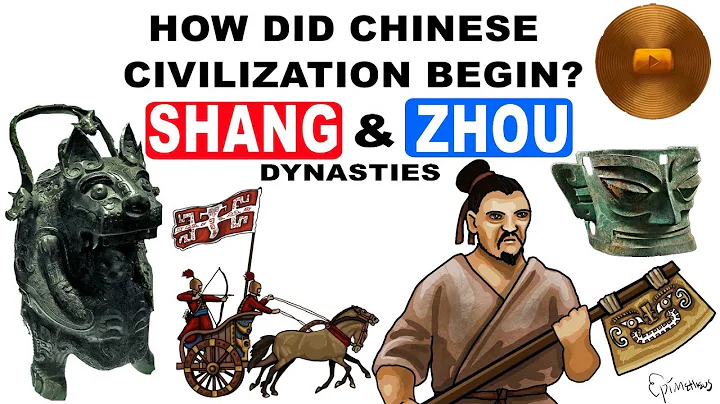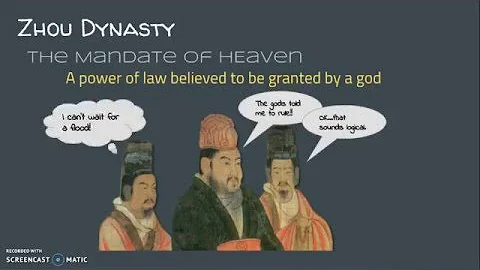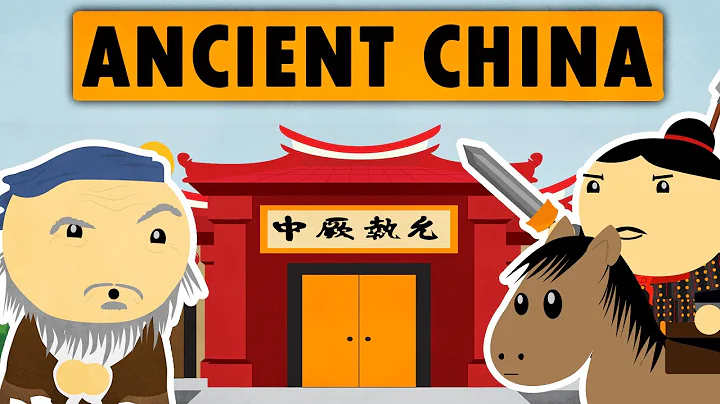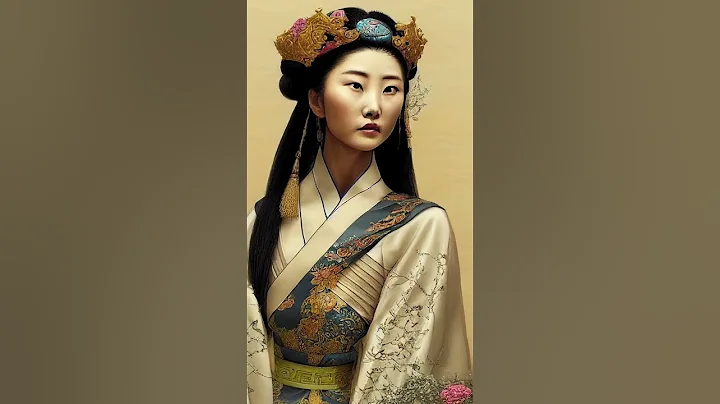Ji Chang's father Ji Li was put under house arrest and killed by the King of Shang
The ancestors of the Zhou people were the sons of Huangdi's great-grandson Emperor Ku and Yuanfei Jiang Yuan, namely Houji. In the early years of the Shang Dynasty , Gong Liu, a descendant of Hou Ji, led his people to move from Tai to Ci. In the early days, the Zhou people lived in the Wugong area of Shaanxi Province. Gong Liu moved the Zhou tribes to Bin, and gradually turned the nomadic tribes into cities based on farming. Starting from Gong Liu, the throne passed through nine generations. When Gu Gong Danfu was the leader of the tribe, the Zhou people were invaded and forced by Xun Yurong and had to migrate. Gu Gongdanfu led his people to cross Qi, Ju and Liang Mountains and moved to Zhouyuan south of Qishan in the Weihe River basin. The word "Zhou" was originally written as: Shang Tian Xia Kou, combining upper and lower parts, and later evolved into the word Zhou.
The Zhou tribe tribe is rich in products, fertile land, convenient irrigation, excellent farming conditions, and rapid economic development. The ancient Duke and Danfu built fields and camps, built towns and cities, and the national power quickly recovered and grew. After moving to Zhouyuan, Zhou had contact with Shang. In order to ensure the safety of the tribe, Gugong Danfu established a stable alliance with the Shang Dynasty, which co-headed the Central Plains Dynasty, and served King Shang Wu Yi. In the Shang Dynasty gathered strength under the protection of , and accepted the cultural system of the Shang Dynasty, especially the concept of destiny. After the establishment of Zhou Dynasty , this concept of destiny was reorganized by Zhou Gongdan and became the political system for governing the world and establishing the country. The basis of legal principles then formed the concept of divine right of kings that has influenced subsequent dynasties for thousands of years.

Gu Gong Danfu, the founder of the Zhou tribe, married Taijiang. Later, Taijiang gave birth to three sons. They were named Taibo and Yu according to the order of Bo, Zhong, Shu and Ji. Zhong and quarterly calendar. Gu Gongdan's father liked his young son Ji Li the most, thinking that he was the smartest and wisest, and Ji Li's son Ji Chang had a sign of holy auspiciousness. Gu Gong and Danfu praised: "If any of my descendants achieve great things, they will be prosperous!"
Taibo and Yu Zhong knew that Gu Gong and Danfu wanted to pass on the Ji calendar so that they could be passed on to Chang in the future. Therefore, in order to avoid being killed in the fight for the throne, Taibo and Yu Zhong fled to the land of Jingman . They cut their hair short according to local customs, got tattoos on their bodies, and hid in the Taihu Lake Basin, and later founded the Kingdom of Wu.
In the twenty-eighth year of King Ancestor A of Yin Dynasty, the ancient Duke Danfu was passed down to Ji Li and was called Gong Ji. After King Wu of Zhou destroyed the Shang Dynasty, he was honored as Wang Ji, also known as Zhou Wang Ji. After Ji Li succeeded to the throne, he upheld the legacy of the ancient duke, governed the Zhou clan, practiced righteousness, and led the tribe to build water conservancy and develop agriculture, making the Zhou tribe gradually stronger. Ji Li also actively absorbed Shang culture. In order to establish political relations between the Zhou tribe and the Shang Dynasty, he intermarryed with the Ren family, a noble of the Shang Dynasty, and took Tai Ren as his wife. At the same time, Ji Li also trained the army, waged war against the surrounding Rongdi tribes, and continuously expanded its military strength, making the Zhou tribe a powerful tribe in the west in the late Shang Dynasty.
Ji Li once led the army to conquer the Xiluo Guirong and captured the twelve kings of Zhai. Later, Ji Li led troops to fight against the Yanjing army. Two years later, he defeated the Yuwu army. Seven years later, he defeated the Shihu army. Eleven years later, he defeated the Yitu army. Later, Ji Li led the army to annihilate the neighboring country of Cheng State to the east, defeated the Rong people in the north such as Yiqu, and conquered many smaller Rong and Di tribes around him.
In the last years of Shang King Wu Yi, Ji Li, as the leader of the Zhou tribe, went to the Shang capital to worship. King Wu Yi of the Shang Dynasty gave Ji Li 30 miles of land, 10 jade carts, and 10 horses; he also named Ji Li the "priest" of the Shang Dynasty and was responsible for animal husbandry. From then on, the Zhou tribe became the leader of the western princes of the Shang Dynasty.
Ji Li led the tribe to attack the surrounding nomadic tribes many times, seized a large amount of property, captured many prisoners, and consolidated and developed the rule of the Zhou tribe in the middle reaches of the Weishui River . Many princes went to submit, making the Zhou Dynasty the western part of the Shang Dynasty. A powerful party country tribe.
The growing strength of the Zhou tribe caused uneasiness among the Shang kings. In order to curb the power of the Zhou tribes, Shang King Wen Ding summoned Ji Li to Yindu in the name of a reward. He was named "Uncle Fang" in name and known as "Uncle Xibo of Zhou". , actually under house arrest. After some time, Shang King Wen Ding killed Ji Li on unfounded charges.Although Ji Li died, the Zhou tribes had developed and grown in the conquest war, laying a certain foundation for King Wen to rule Qi and destroy Shang.

Ji Chang succeeded to the throne, implemented benevolent government, and abolished the punishment of cannon burning.
Ji Chang's father Ji Li was put under house arrest by the King of Shang for a period of time and then killed on unfounded charges. The Zhou people buried Ji Li in Chushan. After Ji Li's death, Ji Chang succeeded to the throne as Xibo Chang.
After Ji Chang succeeded to the throne, he worked diligently and loved talents, and governed the Zhou Kingdom conscientiously. During the period of governing Qi, Ji Chang pursued a moral and benevolent policy internally, advocated "protecting the people" and vigorously developed agricultural production. Ji Chang adopted the policy of "91 and 100% assistance", dividing the fields and allowing farmers to help cultivate public land and pay one-ninth of the tax. Zhou implemented a political system that enriched the people, and levied rents and taxes in a controlled manner, allowing farmers to save. Moreover, Xiqi merchants did not collect tariffs for their transactions, and if someone committed a crime, his wife would not even sit and wait.
Ji Chang was diligent in political affairs, lived diligently and frugally, and recruited talents. Many wise men who came from the Shang Dynasty and other tribes to seek refuge were treated with courtesy and appointed. People such as Boyi, Shuqi, Taidian, Hongyao, Sanyisheng, Wanxiong, Xinjia, etc. all became subordinates of Jichang and became ministers. Ji Chang worshiped Lu Shang as his military advisor, and asked about the military and national plans. He issued the law of "If there is a dead man, he will not read it." It stipulates that slaves will be searched if they escape. Whose slaves belong to whom, and no fugitive slaves are allowed to be hidden. Under the governance of Ji Chang, Qizhou's national power became increasingly powerful.
King Zhou of Shang was dissolute, the people resented him, and some princes also betrayed him, so he increased the punishment and arrested many people who opposed him and had them burned at the stake. The punishment of burning with fire was invented by Daji, the favorite concubine of King Zhou of Shang . Daji used hollow copper pillars, stripped off the prisoners' clothes and tied them to the pillars, and then put red-hot charcoal into the copper pillars to execute the prisoners. In order to increase the fun and enjoyment, King Zhou of Shang ordered the prisoners to walk on the oil-covered copper pillars. If they slipped, they would fall into the fire pit . Their skin would be burnt and their flesh would rot, and they would die unexpectedly. However, Daji, the beloved concubine of Shang Zhou, Seeing this tragic situation, he couldn't stop laughing.
The princes and people gnashed their teeth in hatred when they saw King Zhou of Shang so disrespectful of human life. Ji Chang was also very angry and expressed his willingness to donate a piece of land on the west bank of the Luo River in Zhou Dynasty to King Zhou of Shang in exchange for abolishing the punishment of cannon burning. King Zhou of Shang agreed to Ji Chang's request and abolished the punishment of burning with cannon. As a result, Ji Chang was loved by the people all over the world.
King Zhou of Shang imprisoned Ji Chang, and Ji Chang deduced the sixty-four hexagrams in prison.
Under the governance of Ji Chang, Qi Zhou's national power became increasingly powerful. Zhou owned the territory of Yongzhou , and its power expanded to Jianghan area . Zhou's national power grew stronger and stronger, causing uneasiness in the Shang Dynasty. Chonghou Hu, a close confidant of King Zhou of Shang Dynasty, secretly advised King Zhou of Shang Dynasty that Ji Chang did good deeds everywhere and established his own prestige. The princes all yearned for him, which might not be good for King Shang.
King Zhou of Shang then summoned Ji Chang to Chaoge to have an audience. Before Ji Chang set off, Ji Chang's mother Taijiang said: "My son, I will play the innate arithmetic with you as a mother. You will have seven years of disaster." Sure enough, Ji Chang was subsequently placed under house arrest in Chaoge for seven years. Taijiang, the mother of Xibohou Ji Chang, was good at deducing the Five Elements Bagua. When Ji Chang did not go to Chaoge City and was imprisoned by King Zhou of Shang Dynasty, Taijiang said: "My son, as a mother, I will play with you innate numbers. You will have seven years of disaster." ." Sure enough, Ji Chang was imprisoned by King Zhou of Shang for seven years in Chaoge. After seven years of disaster, Taijiang ordered his maids to burn incense and take money to perform innate numbers. The result was that they accurately calculated the time when Ji Chang would return to his hometown of Xiqi. When Ji Chang stepped into Xiqi's territory one day, the time calculated by his mother Taijiang was exactly the same.
At a very early age, Xibo Hou Jichang began to study and deduce Bagua under the guidance of his mother Taijiang. After Ji Chang went to Chaoge City, Fei Zhong met Ji Chang, and the first thing he said to greet him was: "Excuse me, Xianhou, Zhong Chang heard that Xianhou can perform the innate number, is the result correct?"
Ji Chang Chang set out to pay homage to Chaoge, and King Zhou of Shang imprisoned Jichang in Youli. While Ji Chang was imprisoned in Youli, he had nothing to do and started studying Fuxi Bagua . According to legend, in ancient times, Fuxi created the Xiantian Yi (Xiantian Bagua), Shennong created the Lianshan Yi (Lianshan Bagua), and Xuanyuan created the Guizang Yi (Guizang Bagua).
While in prison, Ji Chang carefully studied the Bagua chart, standardized and organized it, and deduced it into sixty-four hexagrams and three hundred and eighty-four lines. With the hexagrams and line words, it was known as " Zhouyi ". The Eight Trigrams and the Sixty-Four Hexagrams use simple images and numbers, as well as the opposition between Yin and Yang, to show thousands of patterns and reflect endless changes to explain the complex time phenomena.

Boyi Kao was chopped into mincemeat and eaten by Ji Chang
Ji Chang's wife was named Taisi, and she was the daughter of the Xia Dynasty founding monarch Xia Yu descendant Youxin's tribe. Back then Xibohou Ji Chang met Tai Si on the shore of the Weishui River. Tai Si was beautiful, kind-hearted, benevolent and sensible, and lived a simple life, so Ji Chang decided to marry Tai Si. Since there was no bridge on the Weishui River, Ji Chang decided to build a boat on the Weishui River as a beam, and the boats and boats were connected to form a pontoon bridge. Ji Chang personally welcomed his wife, and the wedding scene was grand and spectacular. After getting started with
, Ji Chang managed the outside world and Tai Si managed the internal affairs. Taisi admired the virtues of her elders and followed the example of Taijiang (the royal concubine of Zhou Taiwang) and Tairen (the royal concubine of Zhou Dynasty King Ji Li). She worked hard day and night to run the house in order to advance in women's ways. Taisi was naturally beautiful, smart and virtuous, shared the concerns of state affairs, taught her children strictly, respected her superiors and showed compassion for her subordinates. She was deeply loved by King Wen and respected by his ministers, and was revered as "Mother Wen" by people. Tai Si and Ji Chang gave birth to ten sons, in order: the eldest son Boyikao, the second son Ji Fa, the third son Guan Shuxian, the fourth son Zhou Gongdan, the fifth son Cai Shudu, the sixth son Cao Shuzhenduo, the seventh son Cheng Shuwu, and the eighth son. Huo Shu office, Jiuzi Kang Shu seal, Shizi Ran Ji Zai .
Ji Chang was thirteen years old, and his eldest son Boyikao was born. When he was fifteen years old, his second son Ji Fa was born. The Boyi Kaoshi brothers have been deeply taught by their mother, Tai Si, since they were young, so they have never done anything that goes against common sense or is ridiculous.
After Ji Chang was imprisoned by King Zhou, Boyikao served as a hostage in Yin Shang and drove for King Zhou of Shang. One day Daji came to Boyi's examination room to seduce him. Boyi Kao refused to succumb to her beauty and even severely criticized Daji for not observing women's ethics, thus attracting guards. This incident alarmed King Zhou of Shang Dynasty, who wanted to find out the whole story. Daji accused Boyikao of coveting her beauty and forced her into the room. King Zhou of Shang Dynasty was furious when he heard this. He immediately killed Boyikao, made meatballs, and gave meatballs to Ji Chang for eating, and said: "A saint should not eat meat made by his own son." "Meat soup." King Wen of Zhou finally ate the meat soup. King Zhou said: "Who said Xibo Chang was a saint? He ate the meat soup made by his own son without knowing it."
In fact, Ji Chang pretended to eat it without knowing it, in order to deceive King Zhou and make him think that Ji Chang Chang Divination is just a false name. Ji Chang's ministers Hong Yao and others brought beautiful women, rare objects and fine horses to the Shang King, and the Shang King released him.
In the end, Ji Chang finally made a plan to return to his hometown. When he just set foot on the land of and in the Western Zhou Dynasty, he felt sick and spit out three little white rabbits. He knew that this was the soul of Boyikao San, and he shed tears sadly. The little rabbit looked here and there, followed the road straight into the palace where Ji Chang lived, and wandered in front of Ji Chang's wife and mother. The mother-in-law and daughter-in-law didn't know where the little rabbit came from, but after seeing it, they felt an inexplicable sadness in their hearts. It was getting dark now, and the little rabbit walked into the yard again, looked up at the sky, and then left.
After Ji Chang returned to the Zhou Dynasty, he settled the disputes between Yu and Rui and won the support of the princes. He then defeated the Quanrong and Mixu, destroyed the Chongguo, established Fengyi, moved the capital here, and then conquered the Ni state. , the country of Li was destroyed, and the princes returned in large numbers. "The Analects of Confucius Taibo" said that "two of the three parts of the world are to serve Yin." In the forty-fourth year of his accession to the throne, King Wen was appointed, proclaimed king, and changed his reign. King Wen of Zhou died in his fiftieth year at the age of ninety-seven and was buried in Biyuan.





















